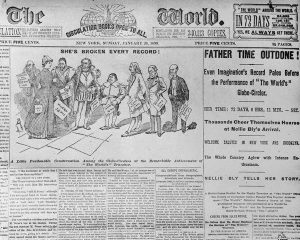During the late 15th century, Spanish sailors encountered a series of islands: Tenerife, La Palma, Gran Canaria, and Gomera–located west of Africa and now known as the Canary Islands. Since these lands had the adequate conditions for growing sugar and producing wine, products in high demand in Europe, it was not long before plantations and trading posts were build by the Spanish.1

Apart from having profitable resources, the islands also became an important stopping point in the trans-Atlantic trade routes, since the islands lay between the New and the Old Worlds. What is often overlooked, however, is that long before the Europeans set foot on these islands and established trading posts, a group of indigenous people lived on these remote lands; the Guanche, a group of blonde-haired and blue-eyed people, resided on the islands.2
When the Spanish arrived, they were surprised to find that the Guanche people lived in stone age conditions: taking shelter in caves and huts, wearing little clothing made of reeds, and using stones and sticks as weapons. Despite their primitive lifestyle, the Guanche lived in a hierarchical society and were ruled by a group of elders and “menceys” (kings). The rest of the tribe consisted of farmers who raised goats, pigs, and sheep in the hills, and with their basic techniques, planted seeds in the valleys. They built pyramids in an east-west alignment indicating that they worshiped the rising and the setting of the sun; they also made pottery and mummified their dead.3

Once the Guanche were discovered by the Europeans, they suffered the same fate that most tribes did in this era; they were forced into slavery on sugar plantations. As a result of harsh labor and of the devastation to the Guanche population, their culture barely survived.4 But if we could rewind time back to the days before the Spanish encountered the Canary Islands, we would still be left with some important questions: How did the Guanche arrive in the Canary Islands? From where do they originate?
There are several theories regarding the mysterious arrival of the Guanche in the Canary Islands, but none are certain. The most mentioned and supported hypothesis is that the Guanche tribe were descendants of the Moroccan Berber tribesmen. Researchers have discovered that the Guanche had similar homes, burial practices, and rock carvings as the tribes that once resided in North Africa. The story goes that there was a group of Berbers in the fifth century who rebelled against the Romans, and were thus exiled to the Canary Islands. It is argued that the Guanche originated from this region because their physical traits, specifically the blond hair and blue eyes, are often also seen among the Berbers, and that Guanche’s whistle-like language “tamazight insular” has its origins in the Berber’s language.5

On the other hand, historian Caroline Spence argues that the Guanche do not originate from Morocco in North Africa; instead, they come from Egypt. According to this theory, the tribe used papyrus reeds to make the boats they used to travel to the islands, and because this material rots rapidly, it would explain why no boat remains were ever discovered.6 There are several other cultural characteristics that tie the Guanche to the Egyptians. For example, both civilizations worshiped celestial bodies and had similar practices when dealing with their dead. The Guanche mummified the bodies of the elite with similar techniques to that of the Egyptians, like binding the nails, packing the body with stuffing, and painting the hair of the mummy with henna. Also, several small step pyramids were found in the Canary Islands that are similar to the Egyptians.’ However, it is unknown whether it was the Guanche who built these pyramids to hold celebrations on or whether they were built after the islands were discovered by Spanish farmers who were clearing stones.7

Due to their physical characteristics, it is also contended that the Guanche are direct descendants from Europeans who–in 3000 B.C.E.–sailed from what is now the French Coast and the Iberian Peninsula, and were left stranded on these Atlantic islands. There are countless other less credible theories that explain the arrival of the Guanche, including one that the Vikings–who were skilled sailors–transported people to the islands, who then somehow lost their knowledge of seamanship.8 Some even argue that the Guanche are the remains of the sunken city of Atlantis, who over time evolved a new language and style of living.


Undeniably, the arrival of the Guanche on the Canary Islands remains an enigma. It is not known when, how, or in what numbers they arrived; it is only known that there is a link between them and other civilizations. No theory is definitive and it is debatable whether the Guanche even interacted with other civilizations prior to 1494, when Alonso Fernandez de Lugo conquered the Canary Islands enslaving and murdering its indigenous people. Despite this, the Guanche culture is not entirely extinct, because on the island of Gomera, the Guanche’s whistle talk survives as a reminder of the baffling existence of the Guanche.9.
- Jerry H. Bentley, Herbert F. Ziegler and Heather E. Streets-Salter, Traditions and Encounters: A Brief Global History Vol 2 (New York: MacGraw-Hill Education, 2016), 352, Kindle Edition ↵
- In Science and Its Times, 2001, s.v. “Jean de Bethencourt and Gadifer de La Salle Colonize the Canary Islands for Spain,” by Judson Knight. ↵
- Arthur Kemp, March of the Titans: The Complete History of the White Race Vol 1 (Ostara Publications, 2008), Chapter 6 ↵
- George Glas, Barker Webb, Sabin Berthollet, and Miss Haigh, “Some Account of the Island of Teneriffe and Its Inhabitants, at the Time of the Spanish Conquest; Taken from the “History of the Discovery and Conquest of the Canary Islands, by George Glas; and the “Histoire Naturelle Des Iles Canaries,” by Barker Webb and Sabin Berthollet,” Transactions of the Ethnological Society of London, no. 7 (1869): 107-114. ↵
- Mario Garcia Conde and Hector Roldan Delgado, “The Last of the Atlanteans,” Child’s Nervous System Vol. 26, no. 9 (2010): 1131. ↵
- Caroline Spence, “Mystery of the Guanche,” Geographical (Campion Interactive Publishing) Vol 72, no. 8 (2000): 43. ↵
- Caroline Spence, “Mystery of the Guanche,” Geographical (Campion Interactive Publishing) Vol 72, no. 8 (2000): 42. ↵
- Steenie Harvey, “Isles of Eternal Spring,” World & I 17, no. 4 (2002): 178. ↵
- “Conquest of the Canary Islands Explained.” Everything Explained Today. Accessed March 2, 2017 ↵



52 comments
Sebastian Carnero
It is good to know their whistle talk is alive and so their culture. It is interesting how many practices and techniques the Guanche shared with other cultures such as the Egyptians and the Berber tribesmen. Even though their traits resemble those of the Berbers and the story of their exile somewhat aligns, it is a long way there and you would expect them to move forward from the Stone Age conditions.
Samuel Ruiz
It was interesting to read that the Guanche people had lived such an old and simple lifestyle as a tribe. It is sad that they suffered as most indigenous tribes did when they were discovered by the more advanced Europeans. It would be nice to learn the true and definite origins of their tribe but only theories are available. Great article!
Caroline Bush
Interesting article! Before reading this article I had never heard about the Guanche tribe. I thought it was interesting to read about the canary islands and the tribes. I enjoyed reading about the theories on the tribes and thought it was interesting how there is so much mystery surrounding the canary islands. Overall this was a very interesting article that I enjoyed reading. I also enjoyed how well researched and detailed it was without sounding too explanatory.
Noah Laing
I wasn’t aware of the Guanche people and I found it interesting that I’ve never studied them in history. They certainly seem to be forgotten by many due to the forces that took them out. The theory that interested me the most however, was that the Guanche people could be the remains of people from the sunken city of Atlantis, nice article.
Didier Cadena
I have never heard of the Guanche people and their origins, so it was interesting to find out a little about their history. It is strange that they would be living in nearly paleolithic conditions during the time period that they were found. I also find it a bit sad that Guanche people are nearly forgotten about, since I feel that not a lot of people have heard of them. The article does a great job of putting all your information in a format that is both interesting and enjoyable to read.
Tyler Sleeter
Really great article with lots of information. I have heard of the Canary Islands as a Spanish settlement, but have never heard of the Guanche. I was not surprised to read that the Spaniards quickly enslaved the Guanche, eventually killing most of them. It did surprise me to read that they Spanish found them living an extremely primitive lifestyle for the time period, a reminder that technology did not develop equally around the world. The mystery surrounding their origins was also interesting to me, along with all the possible theories. On a personal note, I would like to hear the whistle talk you mention.
Joshua Breard
I personally was not familiar with the Guanche people and I think that article is important as it shines light on a subject that can be forgotten. It is sad to think about how people become nonexistent because more powerful sources just overpower them. I think that this story needs to be told as it can relate today with modern day media trying to hide topics from the general population because it is not seen as important to many. Great job!
Justin Garcia
This is a very interesting article. I ever heard the story of the Guanche people. The fact that they lived in stone age conditions during their time period was fascinating. Most societies made the change to settlement by this era and large governments. They survived by their wits and knowledge of the land which shows they had a lot to teach. It is truly a shame that like most other people during the era that they were enslaved and killed off.
Sam Vandenbrink
Interesting Article.The Guanche people are a civilization that’s origin still remains unknown and may never be known. The European Colonist nearly wiped these people from existence but luckily they lived on.There’s an interesting similarity between the Guanche people and the Egyptians. Both of the groups worship the belief of an afterlife and tended to the dead. Very informative article keep It up.
Andrew Rodriguez
This was a very interesting article, I had no idea of who these people were. It’s very crazy, on how they have something from multiple cultures. That’s what makes it so hard to pinpoint there origin, this really makes you think on where they came from. I think the Atlantis theory is very out there, but it would be cool if that was true. The article was very well written in going to intro of the people to the theory. It sucks that they went to enslavement, we could have learned some stuff from them. About there past but know we got to guess.